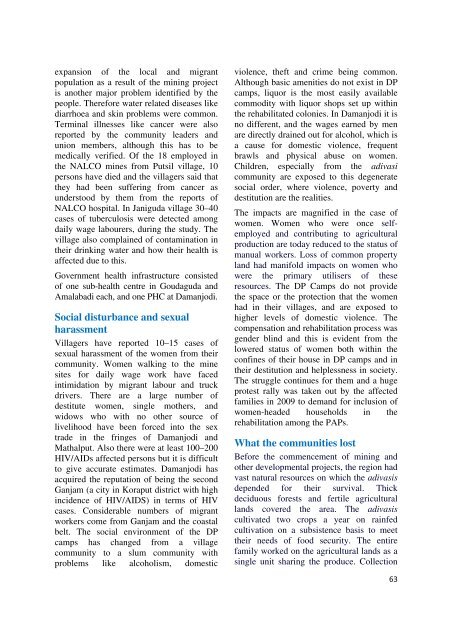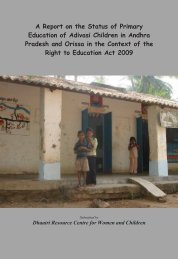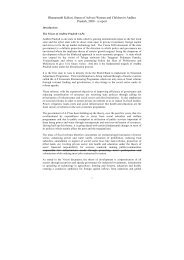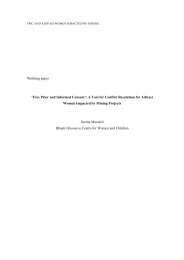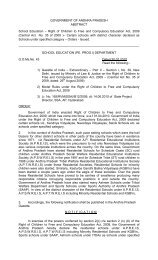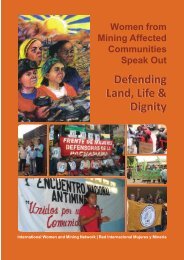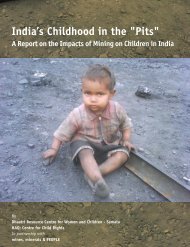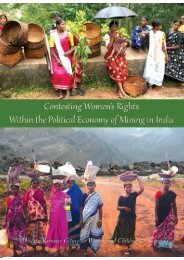Impacts of Government Policies on Sustenance of Tribal ... - Samata
Impacts of Government Policies on Sustenance of Tribal ... - Samata
Impacts of Government Policies on Sustenance of Tribal ... - Samata
You also want an ePaper? Increase the reach of your titles
YUMPU automatically turns print PDFs into web optimized ePapers that Google loves.
expansi<strong>on</strong> <str<strong>on</strong>g>of</str<strong>on</strong>g> the local and migrantpopulati<strong>on</strong> as a result <str<strong>on</strong>g>of</str<strong>on</strong>g> the mining projectis another major problem identified by thepeople. Therefore water related diseases likediarrhoea and skin problems were comm<strong>on</strong>.Terminal illnesses like cancer were alsoreported by the community leaders anduni<strong>on</strong> members, although this has to bemedically verified. Of the 18 employed inthe NALCO mines from Putsil village, 10pers<strong>on</strong>s have died and the villagers said thatthey had been suffering from cancer asunderstood by them from the reports <str<strong>on</strong>g>of</str<strong>on</strong>g>NALCO hospital. In Janiguda village 30–40cases <str<strong>on</strong>g>of</str<strong>on</strong>g> tuberculosis were detected am<strong>on</strong>gdaily wage labourers, during the study. Thevillage also complained <str<strong>on</strong>g>of</str<strong>on</strong>g> c<strong>on</strong>taminati<strong>on</strong> intheir drinking water and how their health isaffected due to this.<str<strong>on</strong>g>Government</str<strong>on</strong>g> health infrastructure c<strong>on</strong>sisted<str<strong>on</strong>g>of</str<strong>on</strong>g> <strong>on</strong>e sub-health centre in Goudaguda andAmalabadi each, and <strong>on</strong>e PHC at Damanjodi.Social disturbance and sexualharassmentVillagers have reported 10–15 cases <str<strong>on</strong>g>of</str<strong>on</strong>g>sexual harassment <str<strong>on</strong>g>of</str<strong>on</strong>g> the women from theircommunity. Women walking to the minesites for daily wage work have facedintimidati<strong>on</strong> by migrant labour and truckdrivers. There are a large number <str<strong>on</strong>g>of</str<strong>on</strong>g>destitute women, single mothers, andwidows who with no other source <str<strong>on</strong>g>of</str<strong>on</strong>g>livelihood have been forced into the sextrade in the fringes <str<strong>on</strong>g>of</str<strong>on</strong>g> Damanjodi andMathalput. Also there were at least 100–200HIV/AIDs affected pers<strong>on</strong>s but it is difficultto give accurate estimates. Damanjodi hasacquired the reputati<strong>on</strong> <str<strong>on</strong>g>of</str<strong>on</strong>g> being the sec<strong>on</strong>dGanjam (a city in Koraput district with highincidence <str<strong>on</strong>g>of</str<strong>on</strong>g> HIV/AIDS) in terms <str<strong>on</strong>g>of</str<strong>on</strong>g> HIVcases. C<strong>on</strong>siderable numbers <str<strong>on</strong>g>of</str<strong>on</strong>g> migrantworkers come from Ganjam and the coastalbelt. The social envir<strong>on</strong>ment <str<strong>on</strong>g>of</str<strong>on</strong>g> the DPcamps has changed from a villagecommunity to a slum community withproblems like alcoholism, domesticviolence, theft and crime being comm<strong>on</strong>.Although basic amenities do not exist in DPcamps, liquor is the most easily availablecommodity with liquor shops set up withinthe rehabilitated col<strong>on</strong>ies. In Damanjodi it isno different, and the wages earned by menare directly drained out for alcohol, which isa cause for domestic violence, frequentbrawls and physical abuse <strong>on</strong> women.Children, especially from the adivasicommunity are exposed to this degeneratesocial order, where violence, poverty anddestituti<strong>on</strong> are the realities.The impacts are magnified in the case <str<strong>on</strong>g>of</str<strong>on</strong>g>women. Women who were <strong>on</strong>ce selfemployedand c<strong>on</strong>tributing to agriculturalproducti<strong>on</strong> are today reduced to the status <str<strong>on</strong>g>of</str<strong>on</strong>g>manual workers. Loss <str<strong>on</strong>g>of</str<strong>on</strong>g> comm<strong>on</strong> propertyland had manifold impacts <strong>on</strong> women whowere the primary utilisers <str<strong>on</strong>g>of</str<strong>on</strong>g> theseresources. The DP Camps do not providethe space or the protecti<strong>on</strong> that the womenhad in their villages, and are exposed tohigher levels <str<strong>on</strong>g>of</str<strong>on</strong>g> domestic violence. Thecompensati<strong>on</strong> and rehabilitati<strong>on</strong> process wasgender blind and this is evident from thelowered status <str<strong>on</strong>g>of</str<strong>on</strong>g> women both within thec<strong>on</strong>fines <str<strong>on</strong>g>of</str<strong>on</strong>g> their house in DP camps and intheir destituti<strong>on</strong> and helplessness in society.The struggle c<strong>on</strong>tinues for them and a hugeprotest rally was taken out by the affectedfamilies in 2009 to demand for inclusi<strong>on</strong> <str<strong>on</strong>g>of</str<strong>on</strong>g>women-headed households in therehabilitati<strong>on</strong> am<strong>on</strong>g the PAPs.What the communities lostBefore the commencement <str<strong>on</strong>g>of</str<strong>on</strong>g> mining andother developmental projects, the regi<strong>on</strong> hadvast natural resources <strong>on</strong> which the adivasisdepended for their survival. Thickdeciduous forests and fertile agriculturallands covered the area. The adivasiscultivated two crops a year <strong>on</strong> rainfedcultivati<strong>on</strong> <strong>on</strong> a subsistence basis to meettheir needs <str<strong>on</strong>g>of</str<strong>on</strong>g> food security. The entirefamily worked <strong>on</strong> the agricultural lands as asingle unit sharing the produce. Collecti<strong>on</strong>63


